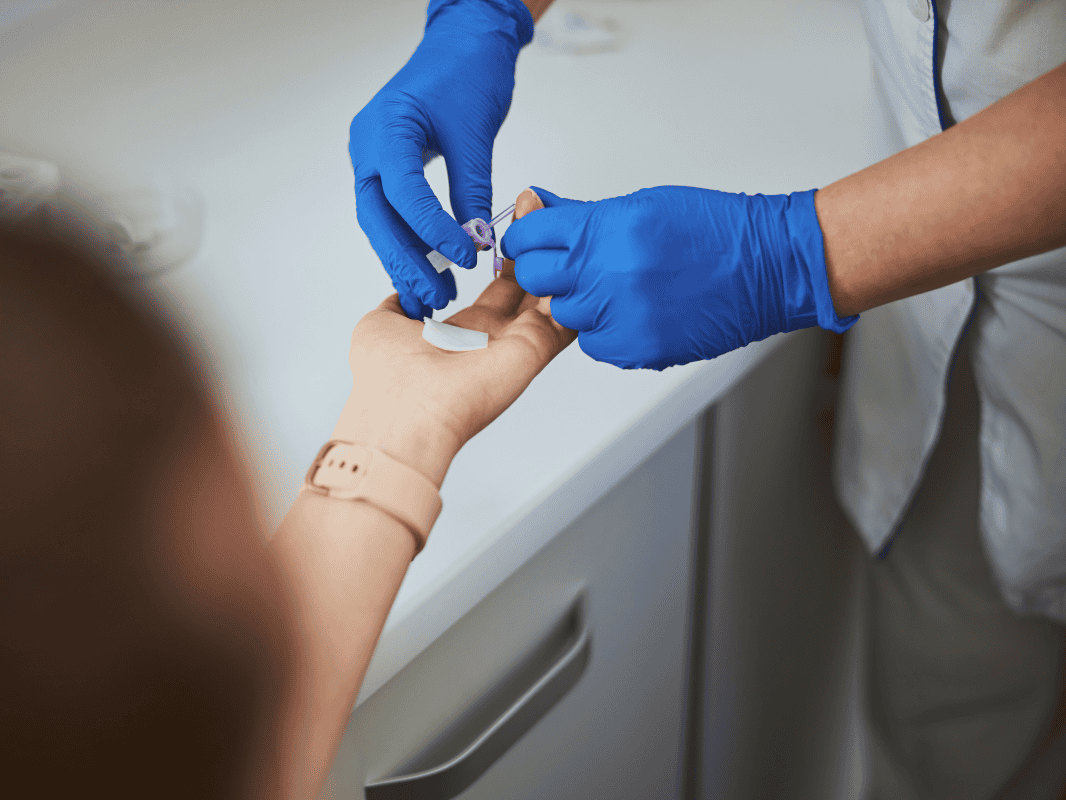Colon Cancer Screenings: Types of Tests + Testing Guidelines
Understanding colorectal screening tests and testing recommendations
Key takeaways
- Adults with an average risk of colon cancer should start getting regular colorectal cancer screenings at 45 years of age
- There are several different types of colon cancer screening tests, including stool-based tests and colonoscopies
- Stool-based tests and CT scans can help detect the signs of colon cancer, but colonoscopies are often needed for a definitive diagnosis
Colorectal cancer screening tests are routine tests used to detect early signs of colon cancer. Screening tests help healthcare providers catch cancers in their early stages, hopefully before they can spread and worsen. Early detection can make it easier to treat cancer if treatment is needed.
Both the American Cancer Society (ACS) and the United States Preventative Services Task Force (USPSTF) recommend that adults with an average risk of colon cancer start regular screening at the age of 45. This article will detail the different types of screenings and general colorectal screening recommendations.
Types of colorectal cancer screening tests
There are several different types of screening options for colon cancer.
Stool-based tests
Stool tests check a stool (feces) sample for signs of cancer. They can often be performed at home with a test kit and are less invasive than a colonoscopy. However, they may need to be performed more often. And a colonoscopy will still be required to diagnose cancer or polyps.
The three most common types of stool-based tests include:
- Guaiac-based fecal occult blood tests (gFOBT or FOBT)
- Fecal immunochemical tests (FIT)
- Stool DNA tests (sDNA), also known as Cologuard®
FOBT and FIT tests check stool samples for traces of blood. Colorectal cancers or polyps can damage tissue in the colon (large intestine) or rectum, which may cause bleeding during a bowel movement. However, there may not be enough blood in the stool to be seen by the naked eye.
A stool DNA test checks for certain DNA changes in certain genes, which can indicate the presence of cancer or other growths like precancerous polyps. These tests can also detect hidden blood in the stool.
While these tests are very similar, they do have some key differences. Here is a more detailed description of what these tests are and how they work.
- Guaiac-based fecal occult blood tests (gFOBT or FOBT):
FOBT tests check a stool sample for blood. Small stool samples are collected and applied to a special card. A chemical is then placed on the sample. If the card changes color, it may indicate the presence of hidden (occult) blood in the stool.
FOBT tests cannot determine whether blood in the stool is from the colon or other parts of the digestive tract. If the test finds traces of blood, you will need to undergo a colonoscopy to determine the exact cause of the bleeding.
Certain foods and medications can affect FOBT test results. If you are taking one of these tests, your provider may recommend that you avoid these substances before testing:
NSAIDs: NSAIDs like ibuprofen (Advil), naproxen (Aleve), or aspirin can cause colorectal bleeding, which may lead to a false-positive result. A false-positive result means that you have tested positive for blood in the stool, but the bleeding hasn’t been caused by cancer or polyps. You may be asked to avoid taking NSAIDs for 7 days before the test.
Red meat: Certain substances in red meat (beef, lamb, or liver) can lead to a false-positive test result. You may be asked to avoid eating red meat for 3-7 days before testing.
Vitamin C: Vitamin C from supplements, fruit juices, or citrus fruits can lead to a false-negative result (a result that doesn’t show traces of blood when there may be some). You may be asked to avoid consuming vitamin C for 3-7 days before testing.
Other foods such as beets, broccoli, turnips, radishes, horseradish, artichokes, mushrooms, cauliflower, apples, oranges, bananas, grapes, and melon can also cause false positive tests.
- Fecal immunochemical tests (FIT):
Like FOBT tests, FIT tests check stool samples for the presence of blood. FIT tests are less likely than FOBT tests to react to blood from the stomach or other parts of the digestive tract.
FIT tests do not require any food or drug restrictions before taking the test. If evidence of blood is found in the stool, you will need to undergo a colonoscopy to determine the cause of the bleeding.
- Stool DNA tests (sDNA):
Stool DNA tests (available in the United States under the brand name Cologuard) check for the presence of abnormal cells and blood in a stool sample. Cancer or polyp cells have DNA mutations in certain genes. Cologuard screens for these changes and blood in the stool to indicate the possible presence of cancer or polyps.
You will need to undergo a colonoscopy if the test results are positive (meaning genetic mutations or blood are found in the stool sample).
Colonoscopy
A colonoscopy is a visual examination of the entire colon and rectum. To do this, providers use a small camera attached to a flexible tube (a device called a colonoscope) that is inserted into the anus. These tests are performed in a procedure room at your healthcare provider’s office or as an outpatient procedure at a hospital.
Here’s what to expect during a colonoscopy:
- You will be asked to remove your clothes and change into a hospital gown.
- You will be given medicine via an IV to help with sedation (relaxation). You may be awake during the procedure, but you shouldn’t feel pain during it.
- Your provider will ask you to lie on your side with your knees pulled up to your chest.
- The scope is gently inserted into the anus and is moved into the large intestine.
- Small instruments may be passed through the scope to collect suspicious tissue (biopsy) or remove polyps.
Your bowels need to be clear during this procedure. To achieve this, your provider may ask you to take steps such as:
- Use enemas for several days before your test
- Avoid eating for 1-3 days before the test
- Use laxatives, if necessary, for several days before the test
In addition to detecting the signs of colon cancer, colonoscopies are used to find signs of:
- Colitis (inflammation in the intestines caused by inflammatory bowel diseases like Crohn’s disease or ulcerative colitis)
- Abnormalities in the intestine (known as diverticulitis)
- Polyps
Virtual colonoscopy
Virtual colonoscopies (also known as CT colonography) are X-rays taken in a CT machine to create a three-dimensional picture of the colon and rectum. This test may be performed as a follow-up to stool samples.
While CT colonography is less invasive than a colonoscopy, these tests do not allow providers to collect tissue samples (biopsies). Because of this, your provider may elect to perform a regular colonoscopy over a CT scan.
Sigmoidoscopy
Sigmoidoscopy (also known as flexible sigmoidoscopy) is not widely used in the United States, as this test can only examine a fraction of the colon. Sigmoidoscopy doesn’t require anesthesia but still requires colon prep.
Recommendations for colorectal screenings
Both the American Cancer Society (ACS) and the US Preventive Services Task Force (USPSTF) recommend that adults with an average risk of colon cancer start regular screening at the age of 45. This should continue through the age of 75.
After this, the decision to screen for colorectal cancer is based on the individual’s risk factors, life expectancy, screening history, and personal preferences.
The ACS advises against colorectal cancer screening in people over 85.
These recommendations are for people with an average risk of colon cancer.
Risk factors for colorectal cancer
If you are at an increased risk of colon or rectal cancer, you may need to test more frequently.
You may be at high risk of colorectal cancer if:
- You have a family history of colorectal cancer
- You have a personal history of ovarian cancer
- You have a history of inflammatory bowel disease (like Crohn’s disease or ulcerative colitis)
- You have been diagnosed with familial adenomatous polyposis, Lynch syndrome, or adenomas (noncancerous polyps)
- A personal history of radiation therapy to the abdomen or pelvis to treat cancer
- You drink more than 3 alcoholic beverages per day
- You smoke cigarettes
- You have obesity
Talk to your provider about colorectal screening
Colorectal cancer screenings are crucial for the early detection of colon cancer. According to the National Cancer Institute, colorectal cancer is the third-deadliest cancer in the United States. Catching cancer early can make it easier to treat.
If you are at average risk for colon cancer, you will likely start screening at the age of 45. Those at an increased risk may need to start screening earlier. Talk to your provider about the benefits and risks of colorectal screenings and the screening schedule that is best for you based on your health history.








